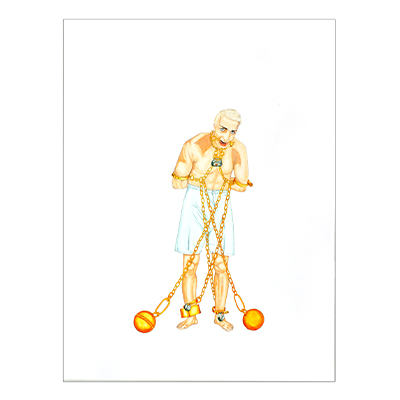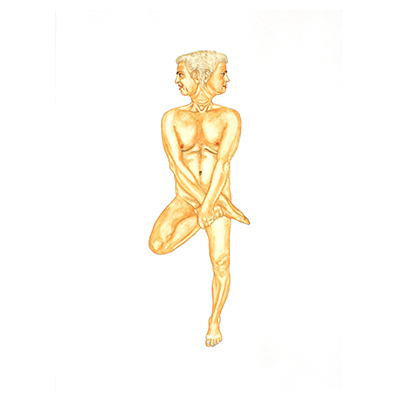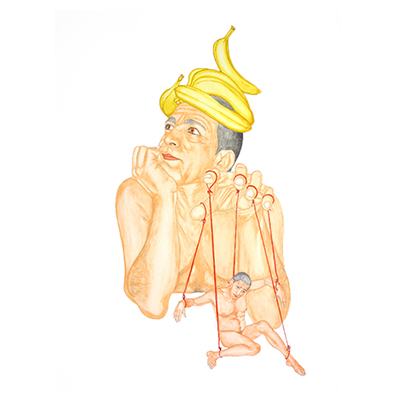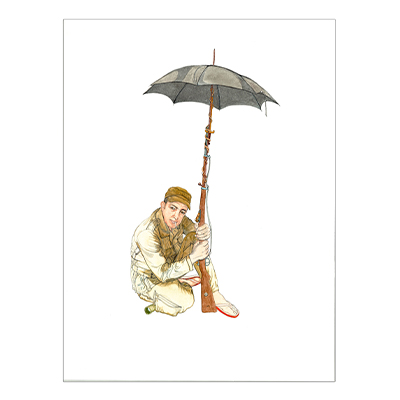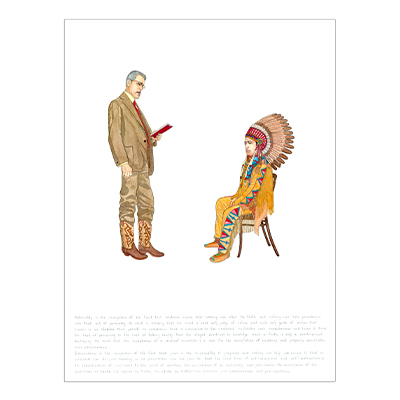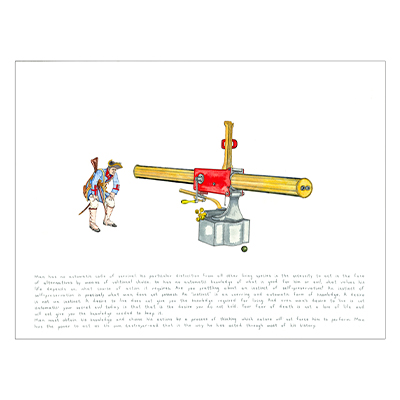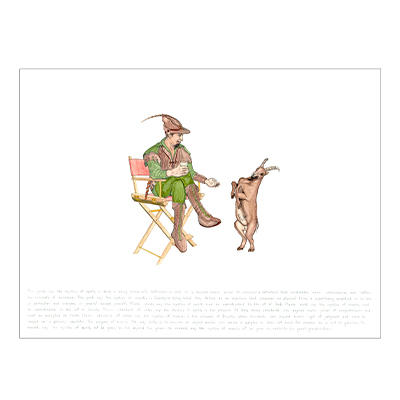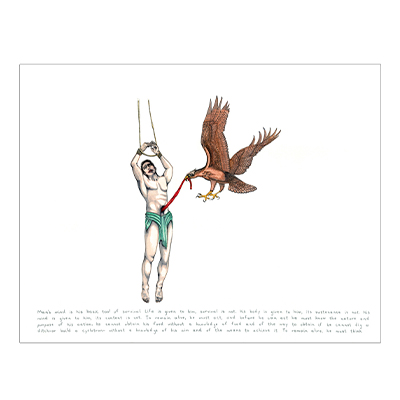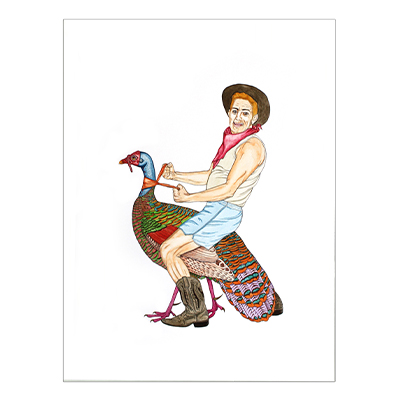Atlas Shrugged
Medium: Drawing series, 2013-2017. Dimensions: Watercolor on paper, 42 x 56 cm each
Shahram Entekhabi's series of drawings, titled "Atlas Shrugged," presents a critical reflection on Ayn Rand's influential novel of the same name (1957) and her theory of objectivism. These watercolor drawings were exhibited as part of the Atlas Program project at Lecture Hall 1. Rand's novel, spanning over 1000 pages, follows the story of Dagny Taggart, who strives to prevent the economic decline of the United States resulting from the mysterious disappearance of industrialists. The book derives its title from the Greek mythological figure Atlas, symbolizing the weight of society. Rand's central question revolves around the consequences if those who bear the weight of society suddenly vanish.
Shahram Entekhabi's series of drawings, titled "Atlas Shrugged," presents a critical reflection on Ayn Rand's influential novel of the same name (1957) and her theory of objectivism. These watercolor drawings were exhibited as part of the Atlas Program project at Lecture Hall 1. (2013/2014: Im Vorbeigehen II/5: "The Atlas Program" — Catholic Private University Linz (KTU), curated by Monika Leisch-Kiesl and Julia Allerstorfer, Linz Austria)
Rand's novel, spanning over 1000 pages, follows the story of Dagny Taggart, who strives to prevent the economic decline of the United States resulting from the mysterious disappearance of industrialists. The book derives its title from the Greek mythological figure Atlas, symbolizing the weight of society. Rand's central question revolves around the consequences if those who bear the weight of society suddenly vanish.
Entekhabi's fascination with the novel lies in its exploration of the philosophy of "rational self-interest" and the theory of Objectivism developed by Rand. According to Rand, rationality serves as the ultimate measure of all things, emphasizing self-initiative and egoism as virtues, while advocating for laissez-faire capitalism as the only correct economic system. These "values" align closely with the ideological and political agendas of the Republican Party in the United States, and the novel is regarded as a foundational text alongside the Bible within that context.
The drawings themselves, executed with meticulous detail and subsequently colored, provide the basis for Entekhabi's surreal visual compositions. Some sheets in the series feature selected passages from Rand's book. The artist assumes the role of the main protagonist across all the works, which lack spatial definition except for deliberate perspective distortions. As a result, the depicted motifs appear suspended yet anchored within an invisible spatial structure.
The hallmark characteristics of Entekhabi's works on paper include graphic precision, a focus on the artist himself, and an apparent absence of space. One watercolor, titled "Thinking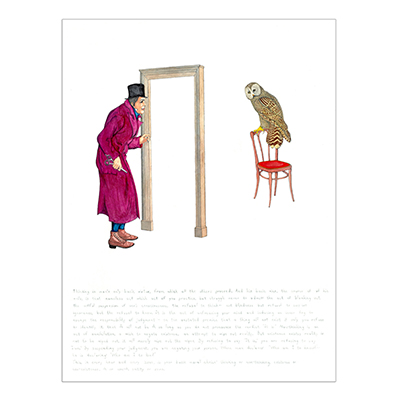 ", portrays the artist donning an eccentric outfit with a top hat and holding a pair of scissors. He stands before an empty door frame, gazing at an owl perched on the back of a chair. The owl, symbolizing wisdom in Greek mythology, engages in a dialogue with the artist. Adjacent to the image, an excerpt from Rand's objectivist thesis emphasizes that "Thinking is a man's only basic virtue, from which all others proceed."
", portrays the artist donning an eccentric outfit with a top hat and holding a pair of scissors. He stands before an empty door frame, gazing at an owl perched on the back of a chair. The owl, symbolizing wisdom in Greek mythology, engages in a dialogue with the artist. Adjacent to the image, an excerpt from Rand's objectivist thesis emphasizes that "Thinking is a man's only basic virtue, from which all others proceed."
In another sheet, Entekhabi is depicted in duplicate, having his shoes polished by his own reflection, perhaps alluding to Ayn Rand's espoused rational egoism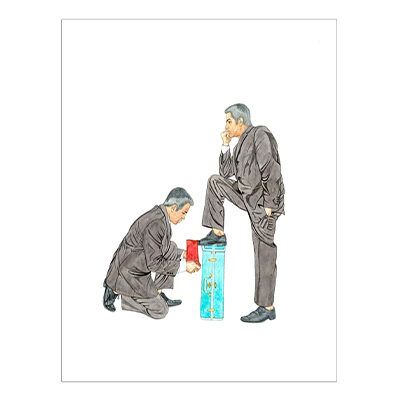 . The recurring motifs of a gray suit and a travel suitcase serve as a thread connecting Entekhabi's works in various media, referencing his ongoing exploration of migration, constructions, and the attribution of cultural identity and alterity.
. The recurring motifs of a gray suit and a travel suitcase serve as a thread connecting Entekhabi's works in various media, referencing his ongoing exploration of migration, constructions, and the attribution of cultural identity and alterity.
One of the drawings, titled "Happiness"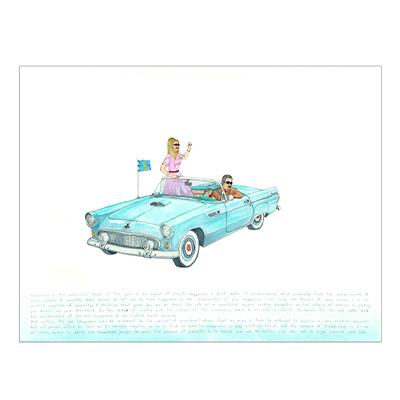 , depicts Entekhabi joyfully laughing with a blonde lady in a turquoise convertible, seemingly embodying the neoliberalist sense of life prevalent in a capital-oriented society. However, it is essential to note that the watercolors in this series transcend being mere illustrations of Rand's philosophy of Objectivism. Instead, they function as an ironic artistic commentary, bearing significant potential for criticism.
, depicts Entekhabi joyfully laughing with a blonde lady in a turquoise convertible, seemingly embodying the neoliberalist sense of life prevalent in a capital-oriented society. However, it is essential to note that the watercolors in this series transcend being mere illustrations of Rand's philosophy of Objectivism. Instead, they function as an ironic artistic commentary, bearing significant potential for criticism.
Entekhabi's "Atlas Shrugged" series engages viewers in a thought-provoking exploration of Rand's ideas, challenging the underlying assumptions of Objectivism and its alignment with political and economic ideologies. Through detailed drawings and a surreal visual language, the artist invites us to question the implications of such philosophies on society and to consider alternative perspectives.
